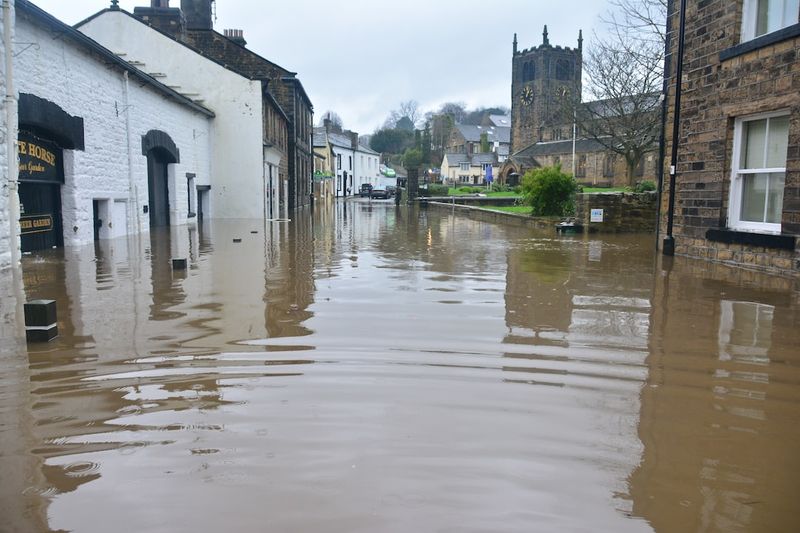Unprecedented Flooding in Libya Leaves 10,000 Missing
The Devastating Aftermath of the Floods
The recent unprecedented flooding in Libya has left a staggering number of missing people, with the Red Cross reporting that 10,000 individuals are unaccounted for. The port city of Derna, where two dams burst over the weekend, has been particularly hard-hit, with entire neighborhoods washed away and over 700 bodies awaiting identification in local cemeteries. The health minister in the eastern administration of Libya has confirmed over 3,000 deaths, but fears that the death toll could climb higher.
A Struggling Relief Effort and Desperate Appeals for Help
Desperate citizens have taken to social media to appeal for information about missing relatives, expressing frustration at the sluggish pace of relief efforts. Inquiries are now being made about previous warnings regarding the need for reconstruction of the city’s Wadi dams. A 2022 academic journal had already highlighted the vulnerability of Derna to flooding in the event of a repeat of the 1959 flood, emphasizing the need for dam reinforcement. However, little action was taken, and now the city is paying a heavy price.
Political Instability and Infrastructure Neglect
The devastating floods in Libya come as another blow to a country already deeply fractured by political infighting, corruption, and external interference since the 2011 uprising that ended the rule of Muammar Gaddafi. Despite efforts over the past decade to establish a functioning unified government, two rival administrations supported by their own militias still dominate the political landscape. This lack of political stability has taken its toll on public infrastructure, with roads and essential services crumbling, and minimal regulation of private building exacerbating the vulnerability of cities like Derna to natural disasters.
Editorial: A Wake-Up Call for Libya
The catastrophic flooding in Libya should serve as a wake-up call to the country’s leaders and the international community. It reveals not only the immediate need for robust disaster response and relief efforts but also highlights the pressing issues of political instability and neglect of infrastructure. Urgent action is required to address these underlying problems in order to prevent further loss of life and damage in the future.
Prioritizing Public Infrastructure and Safety
Investment in roads, public services, and disaster preparedness must take precedence in Libya. The neglect of infrastructure, as evidenced by the inadequate maintenance of the Wadi dams in Derna, has proven disastrous. Comprehensive assessments of public infrastructure vulnerabilities, including dams, bridges, and essential services like communication networks, must be conducted regularly, with immediate attention given to any identified risks.
Political Unity: A Path Towards Resilience
The ongoing political divisions in Libya have hindered progress and inflicted further suffering on the population. The formation of a unified and stable government should be a top priority. The international community must continue to support and encourage dialogue and cooperation among all vested parties to establish a functioning government that can effectively respond to crises and protect the well-being of its citizens.
Advice: Preparing for Future Disasters
Community Education and Awareness
In order to minimize the impact of future disasters, it is crucial to educate and raise awareness among communities about the risks and preventive measures. Efforts should be made to improve the dissemination of accurate and timely information, such as weather forecasts and guidelines for evacuation procedures. Community workshops, public awareness campaigns, and the utilization of local media platforms can play a vital role in preparing individuals and communities for emergencies.
Collaborative Preparedness and Response
Disaster preparedness requires a collaborative approach involving government agencies, civil society organizations, and international partners. Adequate infrastructure, equipment, and resources must be in place to support effective disaster response efforts. Regular drills and simulations can help improve coordination and response times. Additionally, partnerships with regional and international organizations can provide valuable expertise and resources to enhance the country’s capacity to manage future crises.
Long-Term Resilience Building
Building long-term resilience against natural disasters requires investing in sustainable development, promoting environmental conservation, and adopting climate change adaptation strategies. This includes robust urban planning that takes into account the risks associated with extreme weather events and the establishment of early warning systems to provide timely alerts to at-risk communities. Moreover, efforts should be made to integrate resilience-building measures into national policies and programs to ensure their sustainability and effectiveness.
In conclusion, the devastating floods in Libya have exposed the urgent need to address political instability, neglect of public infrastructure, and inadequate disaster preparedness. Immediate action is required to save lives and alleviate suffering, while long-term resilience-building measures must be implemented to mitigate the impact of future disasters. The international community must rally behind Libya to provide the necessary support and expertise in this crucial endeavor.

<< photo by Chris Gallagher >>
The image is for illustrative purposes only and does not depict the actual situation.
You might want to read !
- Editorial Exploration: The upcoming Apple Event in 2023 is highly anticipated, as tech enthusiasts eagerly await the reveal of the iPhone 15. With the event just around the corner, people are searching for the best way to watch the unveiling of the latest iPhone model. This article will delve into the various options available for tuning in to the Apple Event, providing readers with guidance on how to watch the iPhone 15 reveal tomorrow.
Title: “Eagerly Awaiting the iPhone 15: A Guide to Watching the Apple Event 2023”
- The Mysterious Disappearance of Roger’s Wife: Unraveling the Enigma
- The Battle Against Nicotine Addiction: A Lifelong Struggle and the Enraging Reality
- Tragedy at Sea: Over 60 Migrants Feared Dead in Cape Verde Boat Disaster
- Metros Back on Track: Recounting the Chaos of Flooding during the Great North Run
- A Stalemate: Wales and South Korea’s Goalless Friendly Reflects Lack of Firepower
- Cricket Clash in Lahore: Pakistan vs. Bangladesh Battle it Out in the Asia Cup 2023
- The Mysterious Vanishing Act: Speculation Surrounds the Disappearance of Drake and Bobbi Althoff Podcast
- “The Horrific Case of Robert Black: Unveiling the Tragic Fate of an 11-Year-Old Girl”
- “Devastation Strikes: A Grim Aftermath of the Morocco Earthquake”
- Florida Braces for Unprecedented Hurricane Idalia’s Wrath
- The Perfect Storm: How Hurricane Idalia and the Rare Blue Supermoon Spell Disaster




